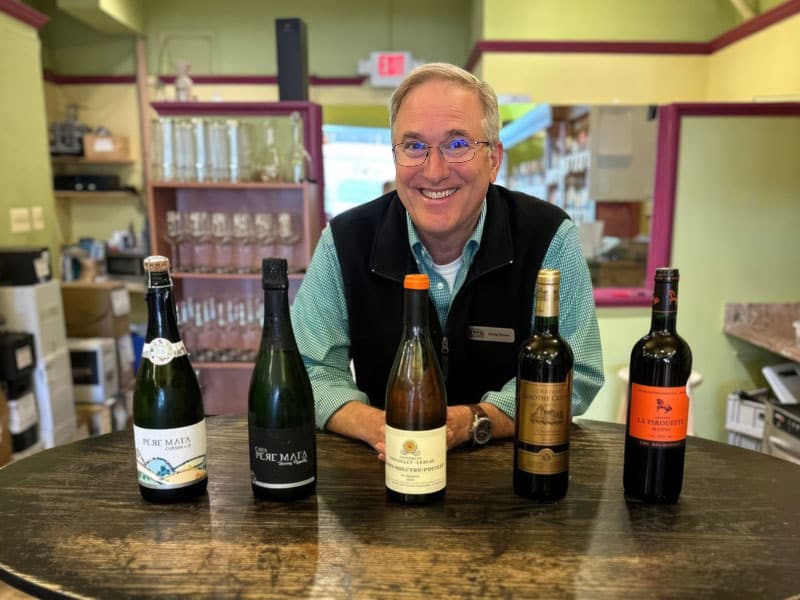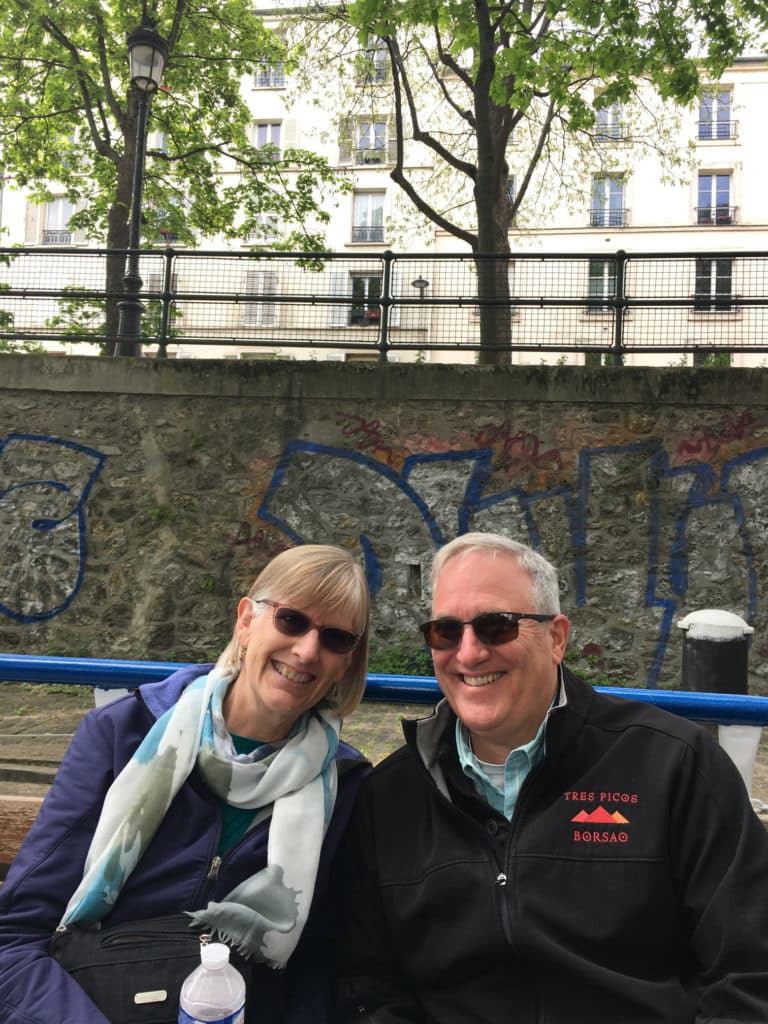Meet Doug House, owner, Chain Bridge Cellars. We learn how a University of Virginia philosophy major came to be in the wine business. A visit to this neighborhood wine shop, which features a wide array of vintages as well as offering free tastings and classes, should be on everyone’s to-do list.
Q. Tell us the story of how you became the owner of Chain Bridge Cellars.
I had a consulting firm for about fifteen years here in Northern Virginia. I sold it in 2004. I was ready to move onto new things but I had a two year non compete in that space so I had to find something to do until I could work back in the competitive strategy world again. I was interested in wine and thought it was kind of an interesting business and figured it would be fun to learn about it so I decided to look for a job in the trade. I was poking around and I emailed the woman who owned this store then, Cecile Giannangeli [Cecile’s Fine Wines].
I offered to take her to lunch and her response was “I have no time for lunch” but if you’re interested in a job, I’m hiring right now. Come talk to me.”
So I went to work for her in fall of ’06 and in 2008 she decided she was done with owning two stores at the time and after some consideration — This is a lot more fun than the consulting business was — my wife and I decided to buy it. We will never forget the day we bought the store because we came out of the closing, got into the car, turned on the car radio and Lehman Brothers went bankrupt while we were in the closing. It was just a really stupid time to buy anything but “Ok.” We’ve been doing it ever since.
Q. Then it wasn’t some back in the day 25-year-old’s American dream?
Oh no, no. I did not grow up in a family with a wine culture. I got a little bit interested maybe in the mid ’90s. But I got really interested in the late ’90s. The online world opened up at that point and I stumbled into a discussion group online and that turned into a tasting group here in Washington. I was in a tasting group for about five years and that just got me really interested in wine and where it came from. Before that I never thought about it at all.
Q. Meaning, it could have been a bread store or something?
It could have been in some ways. The wine business is uniquely attractive to somebody like me. I set out to be a small business owner. In the late 80s when I was working at Marriott, I realized that was the space I wanted to be in because of how it lets you interact with employees and make a difference in their lives. The nice thing about the wine business, especially here in Virginia, is it’s a reasonably complex retail business but not wildly complex.
Q. Explain that — “a reasonably complex retail business” ?
In Virginia, we don’t deal with spirits [Virginia is a control state, spirits are only sold in state-run stores] so the entire large volume spirits world isn’t something you have to deal with, meaning it’s complex but we only have about 1,000 SKU [pronounced “skew”; short for stock keeping unit, is used by retailers to identify and track its inventory, or stock. A SKU is a unique code consisting of letters and numbers that identify characteristics about each product, such as manufacturer, brand, style, color, and size] store so it’s not like you’re running a 6,000 SKU store.
And bizarrely a great asset for somebody like me is that Virginia Is a C.O.D. state [cash on deposit] for wine purchases. We have to pay for wine when it comes in the door which actually acts as a wonderful moderator on getting super excited and buying too much wine thinking you’ll pay for it by selling it. During the recession and some of the other times that have been kind of weird, that has been an asset.
The biggest thing is that I don’t want to make something. I don’t really want to bake bread or make food. That’s not my gig but the wine business lets you make wine a little bit in retail because you know when we drink wine, we’re drinking what’s in our glass but also what’s in our head. When somebody comes in to buy, there’s a chance to tell them things about the wine and sort of contextualize it and give them something to attend to so in some ways we’re like the last step of winemaking before someone takes something home and drinks it. That’s been really enjoyable. I really enjoy having a chance to do that.
House with his wife Meg, in Paris, in the spring of 2022. “Meg is interested in enjoying wine. She likes to enjoy wine and she travels with me sometimes. She will help out in classes but I would say she is a casual enjoyer of it rather than an information absorber about it.”
Q. Where do you get your “interesting” wine recommendations from?
If you go back to when I started in 2006, there were really three main wine publications that we followed. The Advocate and Spectator and Stephen Tanzer were who we paid attention to. The critics universe now is so big and there’s so many of them and they cover so many wines, it’s become incredibly difficult to use them as sources. We taste wine every week. I have people who are trying to sell me wine and they bring wines in so we typically get introduced to a new region or a new thing that way and then based on what we’ve tasted and the little bit we’ve heard there, we’ll go off and learn more about it and decide if we’re really excited about.
Q. Some people might feel intimidated coming into a wine store, especially not maybe knowing much about wine but liking it none the less. Do you have people who come in and know nothing about wine?
Oh my gosh, yeah. That’s kind of what a store like this is for. There are serious wine collectors and experts out there in the world who do read all the critics and they know everybody in Burgundy and they know everybody in Bordeaux. To be honest the way the import trade and and access to wines in California work, if you’re that kind of a buyer, we can be an okay place to shop but if you know what kind of wines you want to buy, you can buy them online and frankly get better pricing or even in some stores in D.C. We refer people who come to buy certain kinds of wines to other stores because they just do a better job than we do.
Our core customer is somebody who either just likes the experience of wine and wants to engage with it or explore or somebody who doesn’t know anything about wine at all. We meet a lot of people this time of year, from Thanksgiving to Christmas, you’ll get a lot of people who are walking into a wine store for like the only time that maybe they intend to walk into a wine store all year. The rest of the year they buy their wine at the grocery store. That’s the opportunity to connect with those people and maybe build a relationship, maybe get them intrigued about what they find when they drink a bottle of wine and then they come back saying “I was intrigued by that, what comes next?” and maybe you have a chance to work from there.
Q. What kind of events does the store offer?
We do free tastings every Friday and Saturday which is a great way to explore the wines we are promoting, our featured wines, and also get to know other wines from other places. Before the pandemic, we also had a pretty active class program that we are restarting. We’re doing champagne classes right now. We do four of those between Thanksgiving and Christmas which are always a blast.
We just set a class schedule for the first quarter, to do some classes on Thursday nights and occasional Sundays. We also do some special tastings. we’re having a portfolio tasting with a local importer and taste fifteen of their wines. We try to do things like that. Once a quarter at least, we’ll do festivals in the store. We have a classroom space in the store that sets up real nice.
Q. Will the new businesses that have opened, Lidl, or are opening near you make a difference in your business? Matchbox, Best Buns?
In my little part of McLean, the issue is just having people in the trade area, This is a trade area that sort of historically rolls up the sidewalks at 6 o’clock. So Lidl being here is just sort of neutral; Matchbox and Big Buns across the street I believe will help our business. I believe it will bring people into the trade area for for lunch and bring them in for dinner and we’re going to monitor that. Right now we close at 7 p.m. all nights. We might look at staying open another hour if there are enough people in the trade area who want to be here. We think that will be really good for us. We were super excited to see that development happen.
Q. How are the Virginia wines?
There are many terrific wines in Virginia and I’m very impressed with what Virginia winemakers do. I will say that Virginia is a very expensive place to grow wine because of the nature of our climate and how hard that hits the grapes and how hard that makes the wine makers, wine growers work. So what we find is that for a given level of quality and style, a Virginia wine is typically more expensive than a similar wine from California or Washington.
Here in the shop we have a small selection of Virginia wine which are purchased mainly for gifts or for the few people interested in exploring Virginia. What we tell people is it makes more sense for you to get in your car and go meet the people who are growing the grapes and making that wine and to buy the wine directly from them because then when you’re drinking that wine, you’re not just drinking what’s in your glass but the experience of having been there knowing about it and maybe becoming part of their story. There are plenty of great Virginia wines, at the retail level they’re less important for a retailer than they are to be sold right at the winery.
Q. Is it mostly McLean residents who are your customers?
The core has always been McLean, Great Falls, Vienna and some of North Arlington but we’ve always had customers, a good number of customers who drive to the store from D.C. and I have a customer or two from Gaithersburg. The pandemic kind of expanded our reach. We expanded our free delivery zone during the pandemic to go all the way to Arlington and Falls Church. That helped to really expand our connection to those people and now that the pandemic is over, we see a lot of those people in the shop too.
Q. Are you still doing expanded delivery?
It’s been interesting — that’s ’s the big change post pandemic. Before the pandemic we would get orders through our website but it was typically people buying wines that were on promotion or particular wine or two. During the pandemic, people got used to actually shopping online, browsing and putting together a set of wines. Before the pandemic, maybe twice a month, we’d see an order with five or six different wines on it, now we’ll see ten or fifteen of those a week — a lot of those people are still using delivery service, they’re working from home. So we take the order on line and call them up and schedule a time and get them over to them.
Q. I noticed you studied history and philosophy at U VA, somehow this makes sense for a wine store owner. Let’s discuss this.
[Big laugh] I will say that the wine business is retail first, that’s actually what we forget is that the wine is second, retail is first and retail is about how you treat your customers; how you interact with them; figuring out how your going to price; figuring out how your going to promote ;that’s all the retail stuff. The wine stuff, again especially for my customers: we need to know things about wine but the reason that my long time customers are my long term customers is less about how much we know about wine and more about how much we know about them. That’s really the essence of the business.
If you get retail right, the wine stuff is learnable and it’s obvious because you’re being presented with it all the time. Nobody out there is really talking to you about how do you greet customers; how do you ask the a question that causes them to break their to-do list mentally; to open up and give you some ideas about what they really want to buy and how do you move past selling them just what they want to do buy. A retailer who is just filling orders is ripe to just be beaten online. For our store what we try to do is we try to help customers take home everything in the shop that they’re really really happy to have especially those things they had no idea they wanted because if we only sold them what they know that want, then it’s just an online business and we’re not adding enough value in the experience, to justify our margin.
Q. You can say that about almost any brick and mortar store, right?
I believe that the fundamental problem with retail in this country is that the the model of retail developed in the ’50s, ’60s and ’70s where being in the right place and having the right stuff in your shop was what it took to be successful — and then maybe having good enough service so that people felt nice when they came in that they prefer you to somebody else. Today you have to create value. You have to create value in the assortment but you especially have to add value in the experience so the customer when they come into the store you can’t just let them just buy what they came to buy, what they thought they wanted, you have to help them discover stuff. Ultimately, to get people to happily pay you the margin you need them to pay you, you have to be delivering something beyond the product, there has to be something more or you get killed online.
Q. That’s pretty profound. So maybe that is philosophy.
More interesting than the English Analytic Philosophy I did my first year in college [laugh out loud].
Explore: Chain Bridge Cellars: 1351 Chain Bridge Rd, McLean, VA 22101; https://www.cbcwine.com/
Interview by Gayle Jo Carter, editor McLean Today.
Do you know someone in McLean who would make an interesting interview for TALK? Click here to nominate them.


